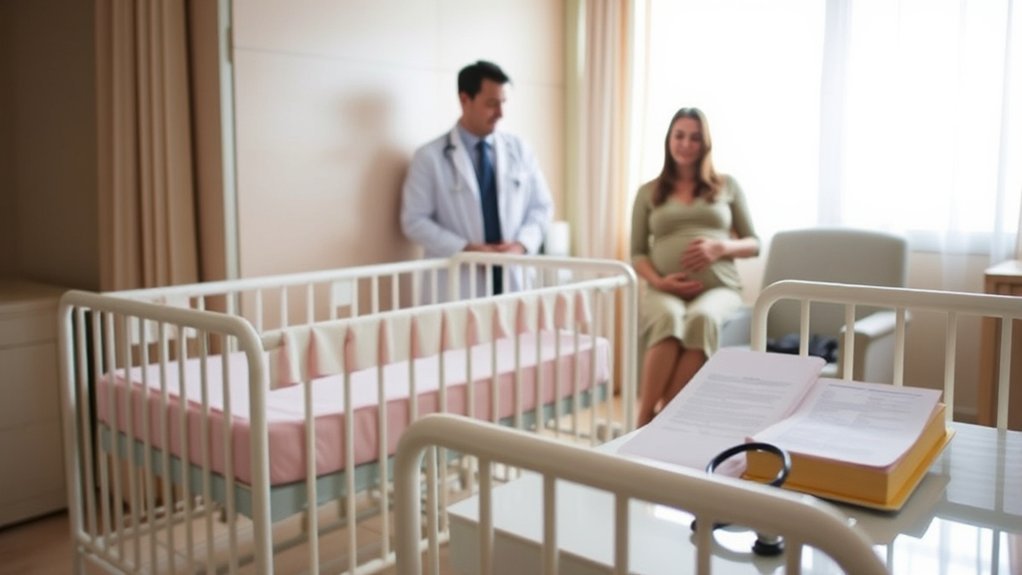When you’re expecting twins, understanding your delivery options is essential. There are unique challenges and considerations that come with twin pregnancies, and knowing when to call your doctor can make all the difference. You might notice signs that indicate it’s time to seek help. What should you look for, and how can you prepare for the unexpected? Let’s explore the important aspects of twin deliveries together.
Understanding Twin Deliveries: Types and Methods
When you’re expecting twins, understanding the different delivery options available is essential for making informed decisions. Typically, you have two main delivery methods: vaginal birth and cesarean section (C-section). Vaginal delivery may be possible if both babies are positioned favorably and are healthy. Many healthcare providers support this option, as it can lead to quicker recovery times. However, if complications arise or if one baby is in a breech position, a C-section might be recommended. It’s important to discuss your birth plan with your healthcare team, who will guide you based on your unique circumstances. Knowing your options empowers you to have a more positive birth experience, ensuring both you and your babies receive the best care possible.
Signs of Labor: When to Seek Help
As you approach the arrival of your twins, recognizing the signs of labor is essential for ensuring a safe delivery. Pay attention to regular contractions that become increasingly intense and frequent; this is a primary indicator. You might also notice a change in vaginal discharge, such as the release of the mucus plug, or your water breaking. If you experience lower back pain that doesn’t subside, or if your abdomen feels tight and hard, these signals warrant immediate attention. Additionally, if you notice any unusual symptoms like severe headache, vision changes, or swelling, don’t hesitate to reach out to your doctor. Being proactive about these signs can help you and your healthcare team prepare for the arrival of your little ones.
Risks and Considerations for Twin Pregnancies
While expecting twins can be an exciting journey, it also comes with unique risks and considerations that require careful attention. You’re more likely to experience complications such as preterm labor, gestational diabetes, and preeclampsia compared to a singleton pregnancy. Monitoring your weight gain and nutritional intake is vital, as twins demand more resources. Regular check-ups with your healthcare provider are essential to track the growth and development of both babies. Additionally, you may face emotional challenges, including increased anxiety or stress, which can affect your overall well-being. Understanding these risks can empower you to take proactive steps, ensuring both you and your twins remain healthy throughout the pregnancy. Don’t hesitate to reach out for support when needed.
Preparing for Delivery: What to Expect
With the unique risks associated with twin pregnancies in mind, preparing for delivery becomes a significant focus. You’ll want to have a solid plan in place, including knowing the signs of labor and when to head to the hospital. Discuss your delivery preferences with your healthcare provider, including pain management options and whether you prefer a vaginal or cesarean delivery. Keep in mind that twin deliveries can involve additional monitoring, so be prepared for possible medical interventions. Packing your hospital bag early and ensuring you have support in place at home can help ease anxiety. Surround yourself with your partner and loved ones, as their encouragement will be invaluable during this exciting yet challenging time.
Post-Delivery Care for Mothers and Twins
After delivering your twins, you’ll face a unique recovery journey that requires special attention to both your well-being and your babies’ needs. Prioritize rest and allow your body to heal; recovery can be more challenging after a multiple birth. Stay hydrated and nourish yourself with balanced meals to support breastfeeding and overall health. Monitor your physical and emotional state, as postpartum depression can affect mothers of multiples more frequently.
Establish a routine for feeding and caring for both babies, and don’t hesitate to ask for help from family or friends. Regular check-ups with your healthcare provider are vital to address any concerns. Remember, taking care of yourself is essential for being the best mom to your twins.
Frequently Asked Questions
Can I Choose a Home Birth for Twins?
You can choose a home birth for twins, but it’s crucial to consult your healthcare provider. They’ll assess your situation and guarantee you have the necessary support and safety measures in place for a successful delivery.
What Are the Chances of Needing a C-Section for Twins?
You’ve got about a 60% chance of needing a C-section for twins, depending on factors like their positions and your health. Discuss your options and concerns with your doctor to make informed decisions.
How Do I Prepare My Older Children for Twin Delivery?
To prepare your older children for twin delivery, involve them in the excitement. Discuss the changes ahead, read books about siblings, and reassure them their love isn’t divided—it’s about to double!
Can Twins Be Delivered Vaginally if One Is Breech?
Yes, twins can be delivered vaginally even if one is breech, but it depends on various factors like the position of the first twin and your doctor’s assessment. Always consult your healthcare provider for personalized guidance.
What Support Options Are Available During Twin Delivery?
During twin delivery, you can rely on support options like a dedicated birth team, continuous labor monitoring, and pain management techniques. Think of it as having a safety net, ensuring a smoother, more comforting experience for you.
